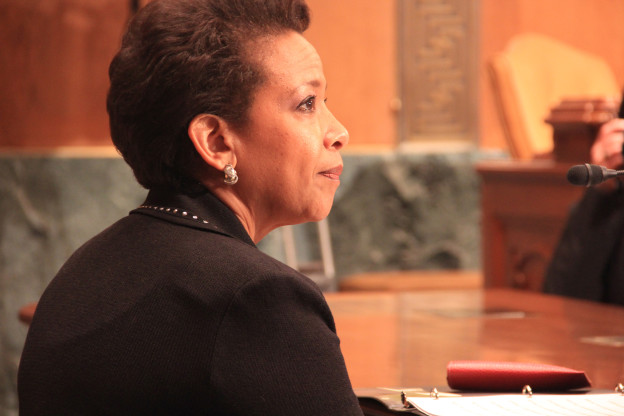WASHINGTON – Attorney General Loretta Lynch said Thursday that improving police-community relations is important in the wake of incidents in Baltimore, Ferguson, Missouri and elsewhere, but the Justice Department’s primary goal is to protect Americans from terrorists and other national security threats.
“Our most important objective must continue to be protecting the American people from terrorism and other threats to our national security,” she said.
The hearing marked Lynch’s first testimony on the Hill since her April 23 confirmation as Eric Holder’s replacement at the Department of Justice. A few days earlier, she had visited Baltimore in the wake of uprisings stemming from the April 19 death of Freddie Gray in Baltimore Police Department custody. Six officers have been charged. The Justice Department has launched an investigation of the Baltimore Police Department at the request of the city’s mayor.
Lynch identified improving police-community relations as one of her chief priorities in her new post, alongside “safeguarding our national security” and “defending the most vulnerable among us.”
Maryland Democratic Senator Barbara Mikulski, a Baltimore native, urged Lynch to help bridge the gap between police departments and wary communities during a Thursday hearing by the Senate Appropriations Committee’s Subcommittee on Commerce, Justice, Science, and Related Agencies.
“In many cities throughout the country, and including my own town of Baltimore, and in communities primarily that have significant populations of color, there has been now a tired, worn and even broken trust between the community and the police department,” Mikulski told Lynch during the hearing. “We’ve got to restore that trust.”
Mikulski suggested ethical training courses on the use of force and bias based on race and ethnicity should be mandatory for Department of Justice grant funding of local police departments.
Lynch started off her testimony by aligning herself with law enforcement officers, remembering two who lost their lives on the job in the past week (in New York and Idaho, respectively) and calling for increased sympathy for cops.
“At this particular time in history, it’s important that we take a moment to consider the contributions and the needs of our law enforcement officers across the country,” she said.
But she also said police must be held accountable for their actions.
“When there are allegations of wrongdoing made against individual officers and police departments, the Department of Justice has a responsibility to examine the evidence and, if necessary, to help them implement change,” Lynch said.
Her testimony touched on her visit to Baltimore last week, citing meetings with local authorities and community leaders to brainstorm opportunities for collaboration, and expressing cautious optimism about Baltimore’s police reform efforts thus far.
“Although the city has made significant strides in their collaborative reform efforts with the community oriented policing services office, I have not ruled out the possibility that more may need to be done,” she said.
Mikulski, who serves as vice chairwoman for both the Senate Appropriations Committee and its Subcommittee on Commerce, Justice, Science, and Related Agencies, also asked Lynch to revisit “the so-called broken window policy” when it comes to policing.
As explained by Mikulski, the theory behind the policy promotes the prevention of major crime through early intervention with youth when they commit lower-scale infractions. But she said that parts of the policy, such as combating issues of truancy and an excess of vacant homes, are being overlooked, resulting in a broken process.
“Now, what seems to happen is the policy has deteriorated where we’ve stopped fixing the broken window and we’ve escalated to frisking,” Mikulski said. “No more fixing, but lots of frisking, and that’s what our folks feel.”
Watch Lynch’s full testimony before the CJS Subcommittee here:
(Video via the CJS Subcommittee website)
CORRECTION: An earlier version of this story erroneously stated that, at press time, six police officers had been indicted — rather than charged — in connection with Freddie Gray’s death.

